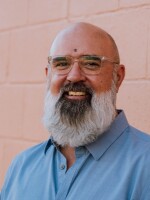Veterans who served at the Nevada Test and Training Range over the past 50 years are experiencing health issues that many of them attribute to exposure to radiation and other contamination during their time there.
KSJD's Tom Yoder talked with local retired Air Force veteran Mike Whitaker, who served at the Nevada Test and Training Range, about the problems his fellow Veterans are experiencing and the challenges they face when trying to get compensation from the government.
In 2016, Dave Crete was at a reunion with other Veterans who worked at the Nevada Test and Training Range in the 1980s. After talking for a while they noticed that they all had similar health problems.
“We've lost a lot of people from mostly cancers of all different varieties. Why are they getting sick? They believe it's linked to plutonium. The Tonopah Test Range was built on contaminated ground,” explained Whitaker.
These contaminated areas are from historical tests that were done in the 40s, 50s, and 60s when they were doing a lot of nuclear testing out there on the Tonopah.
Without any kind of research done to make the connection between these cancers and these illnesses, Veterans who were stationed out in these contaminated areas aren’t getting the care they need.
“They are only getting the normal Veteran’s care you would get because the Veterans Administration doesn’t acknowledge this yet,” Whitaker said. “I applied through the VA for having worked on the Nevada Test and Training Range and they came back and said that there's no proof.”
However, the government did compensate workers at the Nevada test site who were civilians and contractors. Even though there's a connection being made with civilians and other types of personnel, there is not with active duty military.
“When you are active duty military, you belong to the government, you sign your life away. I'm guessing that might be the issue. I'm not sure though,” Whitaker explained.
There are hundreds of people who are sick from being exposed at the Nevada Test and Training Range. Through the decades thousands of military personnel moved through that test area but were never told they were in a contaminated area.
“We all knew that testing went on back in the fifties and sixties, but you don't worry about that when doing the job,” Whitaker said.
But the government continues to station personnel there – it hasn't been shut down completely and put off limits for contamination.
Some civilians were involved with the testing that was going on but that did not cover Department of Defense military personnel. In 2000, President Clinton signed an executive order designed to provide some compensation to Department of Energy personnel. Yet, a lot of Veterans still didn’t get any compensation. Why?
“From what I've been told, there was a Department of Defense representative at a meeting before they were to enact President Clinton's proclamation. And from what I understand that individual was in that meeting and said: ‘Take the Department of Defense people out of the vocabulary. We will take care of those people ourselves. And that never happened,” Whitaker explained.
It seems obvious that there's some connection between so many getting sick, yet nothing is being done individually or as a group to compensate these Veterans.
“With cancer, it's a hard thing to pinpoint and to prove where that comes from,” Whitaker said. “But there is information out there for people because this is all the information they used to compensate civilians. All the evidence is out there.”
Crete created a website to get a history of what happened at the Nevada Test and Training Range and about the Atomic Energy Commission and to learn what you can do to help.
UPDATE (6/11/24): Crete's organization, The Invisible Enemy, has released an informational video that shares the stories of several of the veterans that have been affected by their time at the Nevada Test and Training Range.
This story was shared with us via Rocky Mountain Community Radio, a network of public media stations in Colorado, Wyoming, Utah, and New Mexico including KSJD.



